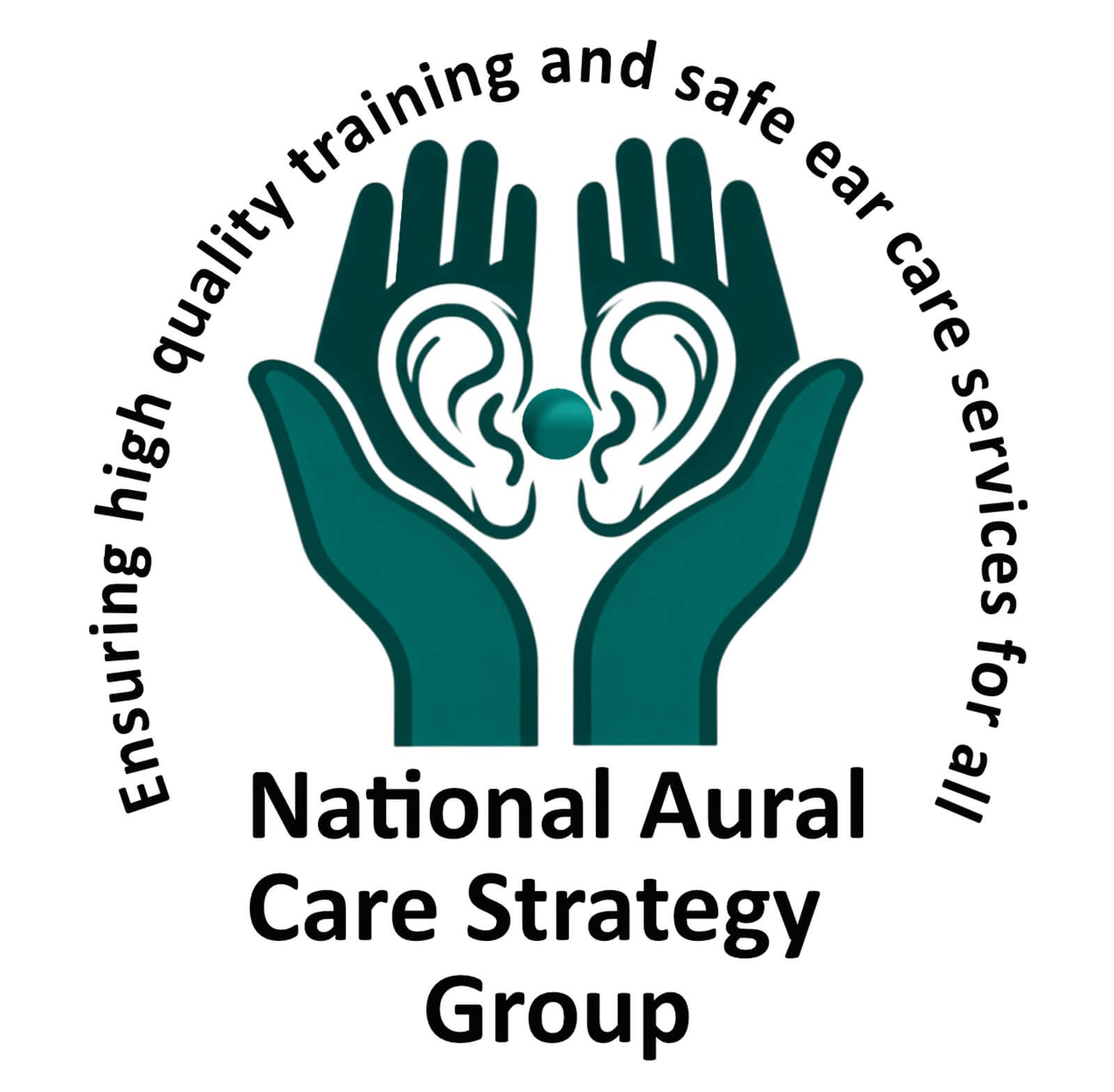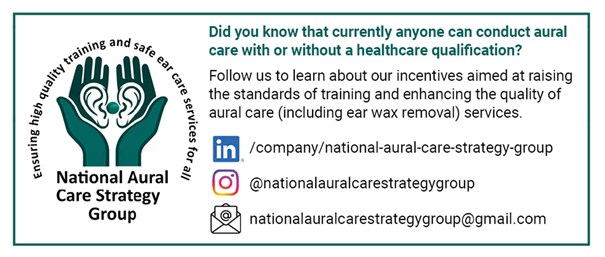Ear wax removal remains a controversial subject in the UK. How will a strategy group support reform in the sector?
Background: elevating standards in aural care
The National Aural Care Strategy Group (NACSG) was established to address the multifaceted challenges surrounding aural care within the United Kingdom and to champion patient safety across the UK’s four nations.

In 2023, a collective of professionals convened in response to significant concerns regarding patient safety and mounting reports of patient harm, voiced by stakeholders throughout the hearing health sector. These concerns centred on inequitable access to aural care across the UK National Health Service (NHS), significant variations in theoretical and practical training for aural care, and varying levels of proficiency of individuals conducting aural care - some with no healthcare background - leading to poor quality of aural care procedures. The potential risks to the public stemming from poor training, inadequate equipment and improper techniques cannot be understated. Initial examinations by ENT UK and the British Academy of Audiology (BAA) underscored these issues, leading to a call for broader cross-sector collaboration. Professional and patient representative groups were invited to join the group to define essential improvements in training, standards and access. In December 2024, this group was officially launched as The National Aural Care Strategy Group (NACSG) and its aim is to stand as a unified front for these critical reforms.
Defining aural care: beyond ear wax removal
The term ‘aural care’ is intentionally employed to encompass the comprehensive management of ear wax, foreign bodies and debris within the ear canal, extending beyond the conventional notion of just ear wax removal. With the proliferation of ear wax removal content on social media, individuals’ first point of call for an occluded ear is seeking the removal of ear wax. It is critical to recognise that impacted ear wax is not the sole cause of ear blockage. Due to the wide variety of pathological ear conditions that can co-exist with ear wax, there are significant risks to patients’ safety if aural care is not conducted with a high level of knowledge, expert skills and competence.
Framing the practice as simply ‘ear wax removal’ undervalues the invasive nature of aural care, which demands strict adherence to infection control protocols, meticulous safety measures, adequate visual acuity and fine motor skills. A comprehensive understanding of anatomy, physiology and the pathophysiology of ear and related medical conditions is essential for accurate diagnosis and appropriate management. When executed by appropriately educated, trained and skilled professionals, aural care can facilitate the vital early diagnosis of various underlying medical conditions and improve overall hearing health and quality of life.
NACSG membership: a collaborative force
The core membership of the NACSG is comprised of voluntary representatives from professional bodies, third sector organisations, individual professionals and regulatory bodies. This includes ENT UK, the British Society of Otology (BSO), the British Academy of Audiology (BAA), the British Society of Audiology (BSA), the British Society of Hearing Aid Audiologists (BSHAA), the Association of Independent Hearing Healthcare Professionals (AIHHP) and the Royal National Institute for the Deaf (RNID), along with a number of aural care training course providers.
The membership is not fixed, and the group recognises that the wider sector expertise and support will be essential moving forward. The group plans to engage with other key stakeholders such as the Nursing and Midwifery Council (NMC), The General Medical Council (GMC), General Pharmaceutical Council (GPhC), The British Association of Audiovestibular Physicians (BAAP), the Hearing Loss and Deafness Alliance, UK-wide NHS bodies, professionals from all devolved nations, the National Deaf Children’s Society (NDCS), the National Community Hearing Association (NCHA) and the Care Quality Commission (CQC). Collaboration with a wider array of aural care training providers will also be explored.
Strategic aims: quality, expertise and access
Prioritising patient safety through improved quality of service delivery is the central tenet of the NACSG’s strategy. To achieve this, the group has identified three strategic aims:
- Standardising training: Ensuring high-quality, individualised and safe practice through standardised theoretical and practical training, along with maintaining competence of those providing aural care.
- Knowledge dissemination: Providing multi-professional and cross-organisational expertise to update public-facing information regarding aural care procedures and relevant healthcare qualifications, thereby promoting the work of the NACSG.
- Equitable access: Advocating for equitable access to safe, high-quality aural care services across both NHS and private sectors.
Key workstreams in action
Members have initiated specific activities, including:
- Minimum Training Standards for Aural Care: To achieve the aim of standardising the training and define the scope of healthcare professionals performing aural care, the NACSG, in collaboration with the BSA, launched a public consultation on the proposed Minimum Training Standards for Aural Care. The closing date for multiprofessional contribution and engagement on the first draft of the Minimum Training Standards was set for 30 September 2025.
The group acknowledges that the current absence of standardised aural care training, coupled with limited clinical evidence, makes professional consensus especially important. These standards will serve to shape the assessment and approval of aural care training courses, as well as the implementation of practical training in clinical settings.
The NACSG is dedicated to reviewing and integrating feedback from the public consultation to ensure that the final document reflects high-quality, safe and effective training standards that cater to the needs of both patients and professionals. With input from various sectors and multiple professions, the NACSG aims to establish standards that are proportional, practical, informed by clinical guidelines and aligned with regulatory frameworks. - The Academy for Healthcare Science (AHCS) and NACSG Aural Care Community of Interest: The AHCS is accredited by the Professional Standards Authority (PSA) and have experience across a range of sectors in establishing communities of interest that lead to development of accredited and non-accredited registers. The NACSG, in collaboration with the AHCS, has developed the AHCS Aural Care Community of Interest (COI) to create a multiprofessional platform for anyone conducting aural care in the UK, and provides the foundational step in defining the group of people conducting aural care nationally.
It is important to note that the COI is not a ‘register’, but it is the very important first step towards creating an aural care register. A strong and growing multiprofessional membership on the COI will enable the AHCS and NACSG to take the next steps toward developing a professional aural care register. We encourage all those currently conducting aural care in the UK to join the Aural Care Community of Interest and support the vision of creating a collaborative community who can influence and contribute to the further development of aural care provision.
https://www.ahcs.ac.uk/aural-care-community-of-interest/
Future directions: NACSG’s commitment
The NACSG will:
- Engage with the broader sector to identify and collaborate with key partners who can support our strategic priorities.
- Explore frameworks for accrediting aural care training courses in the UK, with the aim to improve quality assurance of training courses as well as onsite practical training in clinical settings.
- Develop a national platform for patients and professionals to raise concerns about aural care.
- Collaborate with teams in devolved nations to update online information about aural care.
- Support campaigns to improve access to aural care.
- Develop a public awareness campaign on the risks of ear wax removal.
- Engage with insurance companies to develop criteria for providing professional indemnity insurance based on the Minimum Training Standards for Aural Care, being developed.
The NACSG acknowledges that some activities will be ongoing for some time but will recognise and act on shorter-term opportunities where appropriate.

Declaration of competing interests: AM, Founder and Director of The Art of Hearing Ltd, conducts aural care as part of her daily clinical practice.












